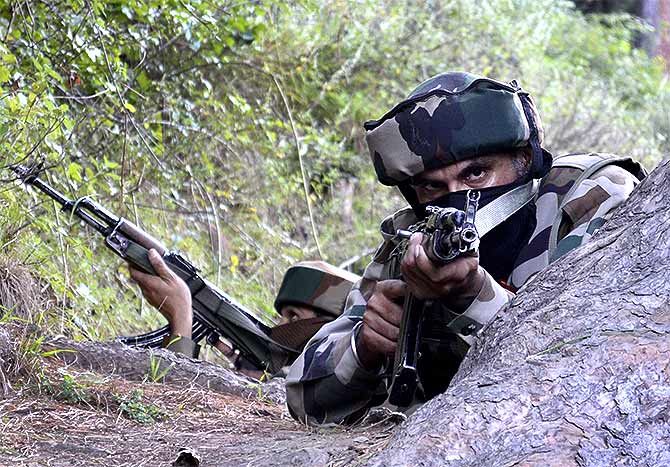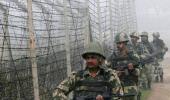
'Syed Salahuddin and Muhamed Sayeed would not have survived so long if they were in the cross-hairs of Mossad,' says Brigadier S K Chatterji (retd).
The ongoing rather dramatic sequel in Jammu and Kashmir started immediately with the first act of Burhan Wani, the poster boy of Kashmiri jihad, being killed.
The second act of the play included the loud echoes of stones bouncing off Kashmir's streets, also off the helmets and body armour of the security forces.
The crescendo was kept at its zenith by ensuring that at the funerals that followed the encounters with the police forces, radicalists incited the crowds to get back to the streets again the next day.
With stone throwing's appeal ebbing, a third adrenaline pumping act had to be enacted to keep the momentum from flagging.
Accordingly, the next act of the play was enacted at Uri on September 18. Eighteen soldiers were killed by a fidayeen. This act packed enough punch in it to set the adrenaline flowing in Indian veins way beyond Kashmir's confines as they carried their dead to distant homes.
A few questions pop out even as television channels continue with the opera: Foremost among them is the apprehensive tenor of a question that lurks in the shadows -- where are the chinks in the Indian armour? How could we lose 18 men in a matter of minutes?
A lot of the weaknesses lie within; and not just with the security forces, at that.
The foremost, is the locational disadvantage that army and police posts face in Jammu and Kashmir. In numerous cases, the posts are separated from a neighbouring village by just a fence -- a few strands of barbed wire.
Barracks for men and stores are yards away and any jihadist fighter can hurl a grenade across to kill fatigued personnel.
There is not enough manpower or equipment to maintain a 24 hour vigil, notwithstanding the shrill cries of the pack that wants dilution of the army's presence in J&K.
There is no wall with observation towers to maintain a vigil. Just the barbed wire strands and the guts it takes to sleep so exposed to danger every night.
The next issue is the fallout of the orchestra of the anti Armed Forces Special Powers Act brigade and activists of all hues who finds stage on national television all too often and project the armed forces as using more force than called for.
A stage has come when a young officer leading an operation or the sentry at the gate or check post is definitely not trigger happy, but quite the opposite -- trigger shy.
If he shoots, a shrill campaign will immediately begin. In the bargain, he presses the trigger a few seconds too late. It actually boils down to shooting only after having come under fire.
Pakistani handlers have understood the psyche and we witness more and more attacks on military establishments.
A lack of offensive design in approach is evident. The world over, killing the jihadist leadership is an accepted design of battle.
If the Indian security organisations can be blamed for any major failure this time, it is their inability/reluctance to eliminate Burhan Wani in time. Here was a man becoming a cult figure, why didn't they go for him earlier?
The jihadi leadership in Pakistan needs to be similarly targeted. If the Research and Analysis Wing has not developed the capability to do it as yet, its leadership requires to introspect.
Hizbul Mujahideen chief Syed Salahuddin and Lashkar-e-Tayiba founder Muhamed Sayeed would not have survived so long if they were in the cross-hairs of Mossad, the Israeli intelligence organisation. To say the least, we are yet to shed our legacy of being soft.
Uri provides ample evidence of jihadis having adequate intelligence. The intelligence is provided by the jihadi groups's over-ground workers who operate just about within the law. The security forces know about most of them. This lot needs immediate and harsh focus.
They provide information, instigate youth, distribute money and are the lifeline for the terrorists.
At Uri, they are the ones who possibly advised the weapon mix for the attack and incendiary grenades were used by the attackers.
We lost 18 men and 30 more were injured. The post was apparently packed well beyond limits that tactical dispersion calls for in a post that was under threat.
With battalions handing/taking over responsibilities in that area, the troop density went higher.
Further, Uri has little or no history of terrorism in the past two decades or more. The population is definitely pro-India. A sense of complacency will creep into the best trained soldiers serving in such areas.
Perhaps, they chose Uri, because we thought it can never be Uri.











 © 2025
© 2025